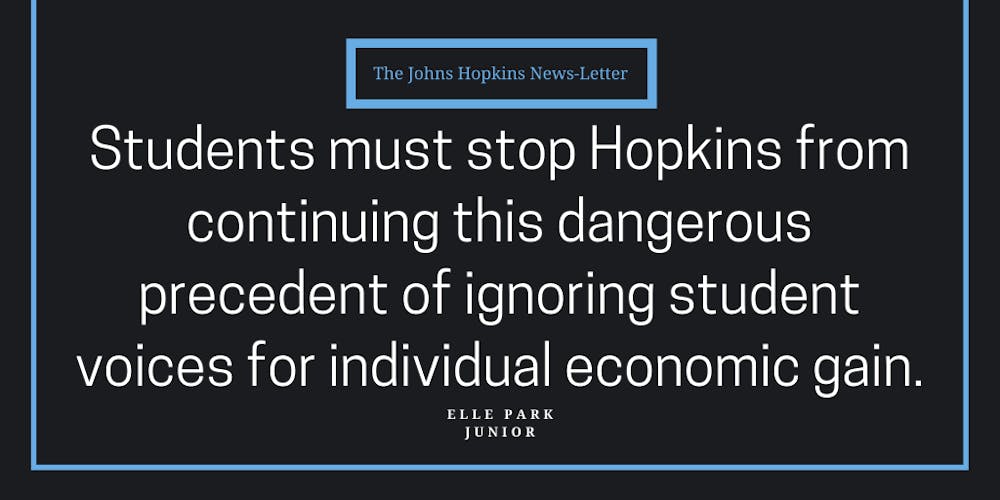It was Wednesday, March 25 at 6 p.m, day 10 of my self-quarantine.
I was in my kitchen watching a recording of a Korean news report from the night before, phone in hand, notifications flying off from multiple group chats and Facebook posts about the grading policy for the semester. At that point, it seemed like Hopkins was leaning toward an optional satisfactory/unsatisfactory (S/U) grading system. Meanwhile on the news, one of the sources discussing the gravity of coronavirus (COVID-19) was from Johns Hopkins University.
There are memes about how Hopkins will be re-labeled “The Coronavirus Tracking Map University” after COVID-19. We are one of the major sources in studies of the public health impact of the virus domestically and internationally.
I’m proud to hear about my institution as a provider of numerical truth, even on news channels as distant as the one my grandparents listen to in Korea. But I can’t help but think this image our University works so hard to curate is at the expense of current students and the deception we constantly deal with from the administration.
I am fortunate to live on the East Coast with supportive parents in a household with an appropriate setting for online learning. It doesn’t impact me much whether class is on Zoom or a recorded lecture. If I really get myself together to focus and get off Instagram or Buzzfeed, I should get all my work done as usual. However, this is not always the case for the entirety of the student body.
Students struggle with unstable homes, food insecurity, time zone differences and so many more issues away from the University. Some of my friends must attend classes between midnight and 6 a.m. — not all of their professors are understanding of missing a lecture due to time differences. There isn’t a policy implemented to protect international students from this harmful, snide suggestion that it is their fault they decided they would like to be home with family during a pandemic. It is unreasonable for the institution to expect 100 percent of our best efforts into schooling when there are students whose focus is not on their education, but on their survival during this tough, unpredictable time.
It is now 14 days into my self-quarantine. Just a few days ago was the announcement of a universal S/U system for both undergraduate schools on the Homewood Campus.
It would’ve been toxic for Hopkins to implement an optional S/U system when the discrepancy of educational setting between privileged students and disadvantaged students is greater than ever before. For students whose safe space for education was at an institutional setting removed from the responsibilities and exhaustion of their homes, they are threatened at their chance for a fair education. There should be an attempt to keep a generous expectation universal for all students, which S/U guarantees.
This does not mean that the University’s response to a new learning system or their methods of announcement have always been the right decisions. As a leading institution in studying COVID-19, Hopkins should have known better than to force undergraduates out of dorms with little to no notice or to have initially pushed for an optional S/U system that punishes students who need institutional aid and understanding the most. Whether or not Hopkins will provide a partial refund for the semester of interrupted education is not even on the table for discussion, to the general public’s knowledge.
Although we receive almost daily email blasts with messages wishing for the health and safety of students and family members, the emails lack transparency on all the options and decisions being made before they are announced to the student body.
Hopkins conclusively made the right decision in the universal S/U policy for the spring semester. However, there are plenty of other instances in which we’ve seen Hopkins advocate for harmful policies that the majority of the student body does not want, even as recently as last year with the decision to have private police on campus.
The Hopkins student body should be more active in stopping and engaging with our institution, beyond only the cases when the politics of school become relevant because they impact GPA. Students must stop Hopkins from continuing this dangerous precedent of ignoring student voices for individual economic gain. We must stand up against decisions that purely boost prestige in the Hopkins name on the news and school rankings.
As an individual, I do not know how we could change the system to make the students’ voices legally matter in policy-making within the University. All I can do is write about the dichotomy of my institution and the frustrations I have felt in the last two weeks.
Elle Park is a junior from Woodbury, N.Y. majoring in Computer Science with a History of Art minor.

















